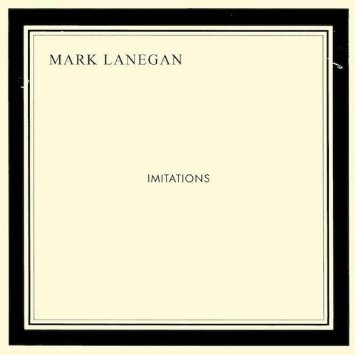How many contemporary vocalists convey the organic forces at work in recorded music as powerfully as Mark Lanegan does? A number of male singers have a cock-waving attachment to presenting themselves as if in the grip of the physical ravages of whisky and tobacco, but this is mere affectation in comparison to Lanegan, whose voice possesses a corporeality which signifies far in excess of the words it articulates. Indeed, it has frequently seemed the case that its nature, wasted and wasting, dictates the lyrical concerns of the songs it sings. Alienated from their instrument on the page, the Skid Row vignettes of ‘Carnival’ or ‘Methamphetamine Blues’ would be dismissed as melodramatic. United with it, however, one can see how the ‘grain’ of the voice – what Roland Barthes defined as "the body in the voice as it sings" – demands such macabre, American Gothic content.
What happens, then, when Dark Mark’s slow-turning lathe of a baritone finds its way into songs written for other voices? Imitations is Lanegan’s covers project, a venture intended to catch another ‘grain’, that of the ‘songs that sounded sad whether they were or not’ performed by the likes of Sinatra, Perry Como and Andy Williams. The peculiar melancholy of music one encounters in their parents’ record collection (Abba and Gerry Rafferty, for example, absolutely kill me) is, therefore, what this album seeks to evoke, although various saloon-bar classics – ‘Autumn Leaves’, ‘Mack the Knife’ – are supplemented with more recent compositions by Nick Cave and Chelsea Wolfe.
Imitations lacks the visceral punch that Lanegan delivers at his best: it doesn’t demand that the listener descend with it in the way that, say, Bubblegum manages to. That’s not to say, though, that it’s a failure; it’s more the case that its emotional palette is a relatively comfortable one. The music is convincingly autumnal, but in a way that plugs it into a vaguely FilmFourish, black & white aesthetic that demands little effort to grasp. It’s a sweet despondency, but it doesn’t challenge, and it’s hard not to see the record as a diversion from Lanegan’s usual, unflinching path.
That said, the stand-out moments are impressive. After a slow start – Wolfe’s ‘Flatlands’ is pretty enough, but it’s a strange choice to open an album featuring some of the most familiar standards of the last century – Lanegan seems to take possession of the material. A version of Nancy Sinatra’s ‘You Only Live Twice’ pares away the intercontinental sass of the original in favour of a gravelly rendition which throws into doubt the lyric’s conviction that life affords second chances. Thereafter, there’s a fine run, consisting of ‘Pretty Colours’, Cave’s ‘Brompton Oratory’, and ‘Solitaire’. Of these, its ‘Brompton Oratory’ and ‘Solitaire’ that seem closest to Lanegan’s shattered and yet sublime territory: the "beauty impossible to define… to believe… to endure" acclaimed by the former has haunted everything he’s recorded in his career since 1986’s Clairvoyance. The rendition of ‘Solitaire’, meanwhile, succeeds through a canny choice to preserve the unnerving schmaltz injected by The Carpenters in their definitive 1975 take, a decision which reminds us that one of Lanegan’s most profound qualities is a capacity to dabble with something not unlike camp.
Covers albums rarely tend to make for the zenith of any artist’s career, but this is at least a reasonably well-executed example of the genre. It doesn’t always work – the version of Gérard Manset’s ‘Élégie Funèbre’ sounds like a bit like a demobbed G.I. struggling with a phrasebook outside the Louvre while the soundtrack to a particularly poignant wildlife documentary plays somewhere nearby – but it’s too good to deserve the ‘for completists’ designation. Regardless of this, it still doesn’t quite shake the suspicion that this is a voice which needs its lyrics delivered bespoke.


